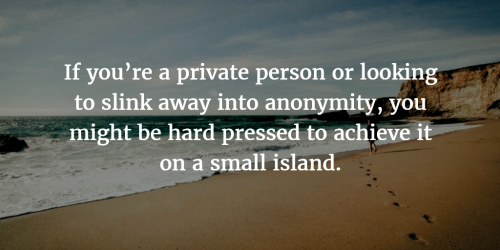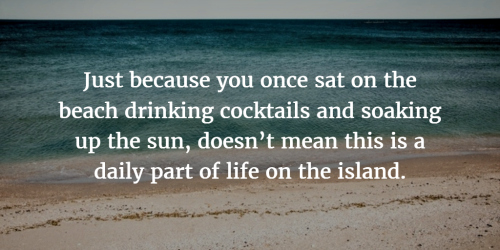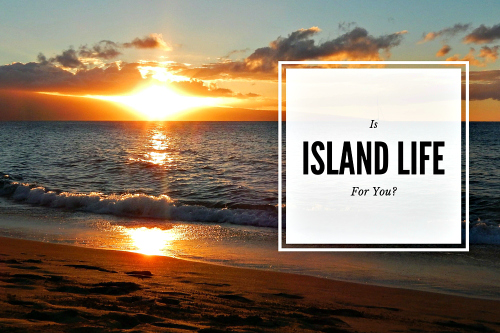It must seem like a dream come true, living in a tropical paradise with a cooling sea breeze rolling up from the soft white sand below and exotic wildlife chirping in the nearby undergrowth.
But island life can quickly turn from a dream to a nightmare. You may have visited the island as a tourist and decided that you just can’t face living anywhere else, then when you arrive at the dockside you realise life is very different outside of the resort.Moving overseas is always a challenge, but moving to an island can compound the problems. It’s not always easy to fly directly into small airfields cut between coral reef and steep mountainside. You may also face having to negotiate the complex but slow-moving bureaucracy required to get visa and job permits. That is assuming you’ve got a job lined up in the limited employment market.
Even once you’ve gotten settled, you will have to integrate into the local community. You’ll stand out as a new arrival for some time and you’ll have to get used to the village-like community where everyone knows everything about everyone. These culture shocks are enough to send city slickers scuttling back to the mainland and the anonymity of metropolis life.
For some, these tribulations are nothing to compete with the natural glory of sunshine, sand and surf. Most islands cultures enjoy a laidback lifestyle and an unhurried attitude to work.
You might be looking to retire to a peaceful corner of the world, or to escape the rat race. Just make sure you know what you’re getting into before you cast yourself away to a far-flung island. Take a look at our tips to get you started.
Make sure you’ve got connections
Islands can be isolating. This should seem obvious, but new arrivals are often in for a shock when they find themselves struggling to find a job.
Thanks to colonial history it’s fairly easy for many nationalities to find an island somewhere in the world they can move to without the need for a visa. That’s not to say that it’s easy to arrive and just get started with your new life. Small islands have small job markets and a limited stock of housing.
Having a friend, agent or employer already on the island makes life a lot easier to hit the ground running. This is even more important if you’re thinking of setting up your own business.
There will be permits to apply for, property deals to sign and supplies to order. If you don’t have a grasp of who’s who and how much things normally cost, you can quickly find your plans unravelling.
Island life can be claustrophobic
Depending on the size of the island, you may find yourself getting dizzy driving around it multiple times a day. The morning routine of dropping off the kids at school, going to work, collecting the kids and going to some evening activity may drag you round the entire circumference.

Some expats from big cities or open rural landscapes find themselves getting cabin fever, constantly treading the same paths on a daily basis. Jennifer Barclay, an author living on the Greek island of Tilos, told Wanderlust just how small island life can be: “it’s only eight miles long by a few miles wide.”
With a population of 300 people, Barclay’s life in Tilos is closely scrutinized by her neighbours, but she also has to work hard to become part of the community. “Traditional dance isn’t just a quirky museum piece here,” she says, “if you don’t know the dances, you really can’t be seen as part of the community.”
If you’re a private person or looking to slink away into anonymity, you might be hard pressed to achieve it on a small island.
The key to success in most small communities is to start networking early, meet the locals and learn their traditions. But most of all, don’t expect to be adopted into the fold immediately; you may be seen as a newcomer for years to come.
When things change, they change quickly and in a big way
Fijians joke about ‘Fiji Time’ – a very real concept that keeps the pace of life slow, meeting times flexible and productivity to a comfortable low. However, even on this sleepy South Pacific archipelago, events can happen quickly. Recent history has provided Fiji with a number of armed coups and dictator-led governments.
In small societies events can snowball quickly, and even the smallest ripple can cause turbulence for everybody. Political turmoil can take hold quickly on an island, but many are also beholden to a higher level of government that can cause upsets.
The Greek half of the Mediterranean island of Cyprus has its own policymakers as well as coming under the jurisdiction of Athens and above that the European Union. A popular destination for British expats, the economic turmoil in Greece and threats of expulsion from the EU have put Brits there in limbo.
Property prices have shot up as Chinese and Russian speculators take advantage of the economic downturn. Commodity and retail prices have risen as Greek suppliers go bust and visitor numbers have dropped, hammering the tourist business.
It’s not just manmade trouble that can rock the boat. The residents of Montserrat were swiftly evacuated by the Royal Navy in the 90s when the volcanic island erupted in smoke and ash. Haiti was levelled by a powerful earthquake and the Caribbean is battered every year by powerful tropical storms.
Being surrounded by ocean increases the risk of flooding and gives limited room to escape disaster. In the aftermath, limited resources and remoteness from sources of assistance can leave island residents facing a second round of challenges.
Island expats need to face up to the possibility of just about anything happening to upset their idyllic life. Take what precautions you can, but if the possibility of upset sends you reeling in anxiety, island life might not be for you.
Be ready for bugs, heat and dodgy roads
Having said that, it doesn’t take a disaster to make life difficult.
There will be lots of opportunities to endure little hardships too. Hot, humid climates in the tropics and wet, windy weather just about everywhere else typify island life.

Amanda Walkins, a freelance writer for Huffington Post, reports that Caribbean life is one hot, sweaty day followed by a long bug-filled night. “Temperatures in the Caribbean stay high year-round,” she says, “have you accounted for the humidity? The mould never ends.”
There is also an unending supply of biting insects to contend with,. “You can kill millions of mosquitoes,” she says, but even then “there are still millions more. There are sand fleas and cockroaches, spiders and ants.”
The infrastructure of small islands is also designed to test the grit of expats. Poor governments and plenty of use means local roads are full of potholes and the buses are overcrowded and rickety. For some, this is just part of the fun and the charm of living away from the big city.
Get used to doing without
Most island nations rely on container ships to keep them supplied with the essentials, and luxuries are way down the shopping list of priorities.
Supermarket shelves may stock only one brand of products and the cost may be driven up by the expense of shipping. Get used to the idea of doing without your favourite shampoo label and having a limited range of fashion trends. Make the most of local food produce to keep grocery bills affordable.
As you go about settling in you may find that larger items have to be specially shipped to you, further driving up prices. Air conditioners, cars, furniture and building materials may take months to arrive and face customs checks and mountains of paperwork before actually making it to you.
If you are setting up a business that requires specialist equipment, check as early as possible to see if there are suppliers on the island who can get you what you need.
Sometimes you’ll be amazed by what is readily available and what is seemingly impossible to find. In Fiji it’s easy to buy scuba equipment and parts of marine engines, but consumer electronics are limited and expensive.
Expats with a need for the latest gadget or people who want to constantly update their wardrobe should think twice before stepping ashore.
Tourists, tourists, tourists
Get used to the idea of your sleepy paradise being invaded by camera-toting mainlanders. They’ll clog up the roads with coaches and hire cars, buy the stores out of all their stock and look ridiculous in flowery shirts and sunburnt skin.
Laugh quietly to yourself if you must, but remember that you too probably first arrived as a suitcase-dragging outsider, and your livelihood probably depends on them now as well.
Even on the Cayman Islands, with their rich business interests, tourism is a significant portion of the overall income. If your line of work isn’t directly geared towards tourists, the island economy probably still needs the foreign cash to keep going.
Make sure you strike the careful balance between protecting trade with the tourists and not harming the local character. Setting up noisy, boozy neon-lit bars might be a great money spinner, but opening one in the historical heart of a town is a quick way to lose friends.
Bring some savings with you
Even if the daily cost of living is a bargain compared to city life, you’ll want to bring a few spare bucks.
Project costs can quickly rack up once you consider that local workers may disappear during the tourist season, or storms may bring progress to a halt.
Even in tax-free paradises, expect to pay extra for the basics and to rent vehicles or property until yours are ready. Blogger Minazahmadi writes of life in the Caymans, “Be prepared for an expensive first few months, where outlay will be required on rental deposits, cars, and setting up utilities and their related deposits. It can really stretch your finances.”
It takes at least a year to settle in
Even if you know the island fairly well, it won’t be home as soon as you arrive. It takes a few months to get your life in order, a few more to work out where everything is and then a few more months to start taking advantage of everything that’s on offer.
This is true for everyone living abroad; all expats will need enough time to settle in properly before making an informed decision about whether or not they enjoy life in their new home.
This is probably even more true on an island, where it can take a little longer to get things done and for the locals to warm up to you.
Don’t make the move for money
Even if you think you’ve got a sure-fire, big-bucks, money-spinning idea, don’t move just for the money.
Firstly, your genius plan may not be quite as clever as you thought, or you may come up against some unexpected hurdle that derails the whole endeavour.
Secondly, money isn’t the route to happiness. If you are rolling in cash on your island paradise but miss the hustle of the big city, you are going to get fed up soon.
A large number of former brokers, bankers and Wall Street wonders live in the Caribbean. This isn’t because the islands are a great place to make a buck; it’s because these financial veterans are tired of the business battlefield and are looking to live out their days as far from it as possible.
Life isn’t always a beach
Just because you once sat on the beach drinking cocktails and soaking up the sun, doesn’t mean this is a daily part of life on the island.
While you were playing, others were working, and you can bet they’ll still be working hard when you move in.

If you are honest with yourself you’ll know all this to be true. If you are still set on an idyllic island life, and are willing to put in long nights chasing papers and long hot days battling with bugs, then you might just be the right kind of person to for island life after all.
Have you moved to an island? Share your experiences in the comments.
Article by Andy Scofield, Expat Focus International Features Writer

